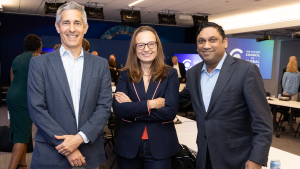Seaweed Success, Niger's Coup, and Delivering Profits
Check out our roundup of the week's top news and research in food, agriculture, and global development.

Top Story
The Missing Grain Deal
Only 17 African leaders attended Putin’s summit as he tried to unite Russia and Africa in a fight against Western powers. No formal grain deal was reached, but Putin promised 25,000 to 50,000 tons of free grain, falling short of the 752,000 tons of grain the UN World Food Programme provides.
Council Insights
Youth in Agriculture
“Youth is believing that change in systemic change is possible and believing in what we're trying to achieve,” said CEO and co-founder of the Farmlink Project Ben Collier in our limited podcast series. Check out the complete series now.
Food and Agriculture
Niger’s Coup on Aid
Amid a junta military coup, Western and EU nations have halted aid to Niger, and West African leaders had an emergency vote to break ties with Niger. The country will experience food strains from lost aid, including Germany's $132.36 million intended for agriculture and food.
Delivering Profits
Uber announced second quarter growth in revenue and gross bookings as their CFO steps down. Even with restaurants re-opening post-pandemic, their food delivery services remain in high demand, except for overseas food delivery where the company laid off hundreds of employees.
Economic Tough Patch
Nigeria’s President Bola Tinubu shared new economic initiatives as more labor unions threaten to strike. To stabilize food prices, he promised 200,000 metric tons of grain, along with seeds, fertilizers, and farm inputs. Yet, Tinubu is still criticized for raising food prices by eliminating gas subsidies.
Deeper Dive
Behind Niger's Coup
Niger’s president, Mohamed Bazoum, was overthrown by self-declared coup leader General Abdourahmane Tchiani for reasons that remain unclear. Bazoum had raised hopes that Niger was on a democratic path—he promoted girls’ education, sought to reduce Niger’s birthrate, and oversaw an impressive economic revival—but the coup puts the future of the country in question.
Resilience
Regenerative Agriculture
Walmart and PepsiCo have partnered to support regenerative agriculture across over two million acres of farmland. The collaboration aims to lower greenhouse gas emissions by approximately four million metric tons, and to improve soil and water health.
DC Report
Wishing for Sustainability
USDA’s Foreign Agricultural Service is partnering with the World Initiative for Soy in Human Health (WISHH) to foster agricultural sustainability, boost food security, and promote US products worldwide. WISHH currently operates programs in 29 countries across sub-Saharan Africa, Latin America, and Asia.
Big Actors
New Support
British Foreign Minister James Cleverly is set to announce a new package of support to make Nigeria's agriculture sector more climate resilient. The package includes a £55 million contract to help transform Nigeria's rural economy and a £2.9 million grant to support over four million people adopting sustainable agricultural practices.
Big Ideas
Seaweed Successes
In Alaska, seaweed farming is being hailed as a low carbon footprint alternative to traditional crops and fisheries. It's nutritious, doesn't require fertilizer or added nutrients, and absorbs carbon and nitrogen as it grows. The industry faces challenges in scaling, but it offers hope for a more sustainable future.
Ask an Expert
What is the difference between food insecurity as a result of hunger, and food insecurity as a result of malnutrition?
"We typically think about hunger in terms of quantity—whether people have enough food to meet their daily caloric needs. Even so, it is not only possible, but common, for individuals to eat enough calories and still be undernourished. Malnutrition happens when diets are unbalanced, either by consuming too little or too much of certain nutrients, and can take the form of stunting, wasting, anemia, obesity, and diet-related diseases."
— Research Assistant Kailey Griffith in GFFT


Have a question about food and agriculture? Ask one of our experts at the Center on Global Food and Agriculture to get an answer in next week's Global Food for Thought!
Council Events
Did you miss one of our previous livestreams? Don't worry! They are all available on our website to watch at any time.
Other Upcoming Events
Urban Grower’s Collective Food Stand
Date: August 5
Time: 9:00 a.m. - 4:00 p.m. CT
MFAI Emerging Crops for Soil Health – Field Day
Date: August 9
Time: 10:00 a.m. – 1:30 p.m. CT
Food Security Trends and Resilience-Building Priorities
Date: September 1
Time: 9:00 – 10:30 a.m. ET
Market Concentration in the Grain Industry: Implications for Food Security?
Date: September 7
Time: 9:30-11:00 a.m. ET
iSEE Critical Conversation 2023: Climate-Smart Agricultural Practices and Resilience in the Midwest
Date: September 18
Time: 4:00 – 6:30 p.m. CT
Land Acknowledgement Statement
The Center on Global Food and Agriculture recognizes it occupies the ancestral land of the Kiikaapoi, Peoria, Kaskaskia, Bodwéwadmi, and Myaamia people. Indigenous communities around the world disproportionately experience the pressures of climate change, global conflicts, and the COVID-19 pandemic, while simultaneously stewarding 80 percent of the world’s biodiversity. These Indigenous tribes and nations are the original owners of this land and continue to be systemically erased by policies and practices that ignore their histories. To learn more about Indigenous foodways and practices, check out our 2022 blog series "Stewardship, Sovereignty, and Solutions."
Related Content
- Embracing Dandelions as Food and Medicine
- Going Beyond Regenerative Agriculture on Tribal Lands
- Expanding "638" to Enhance Native American Food Sovereignty
- Flavors and Culture: Food Systems Through Indigenous Women's Eyes
- A Thanksgiving Legacy: Fighting for Indigenous Food Sovereignty
- Native Food Sovereignty: Strengthening Connection to Culture
- Reconnecting to Indigenous Food Sovereignty Values and Practices
- Embracing Interconnectedness: How Indigenous Foodways Can Save Us






